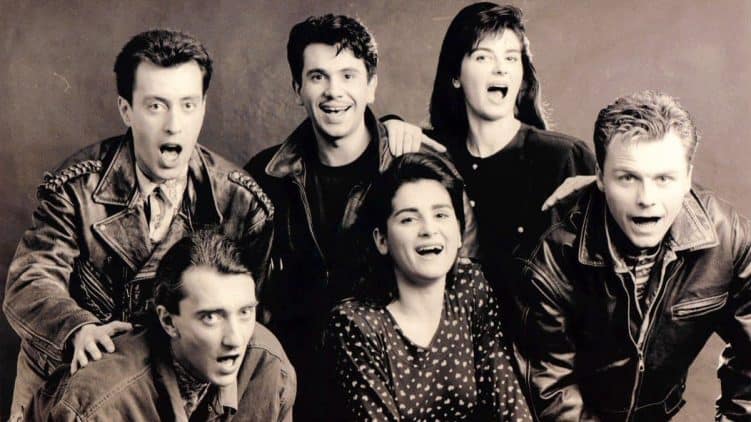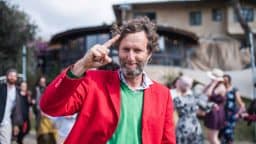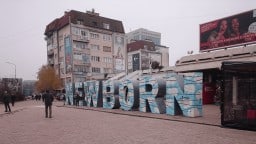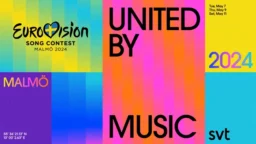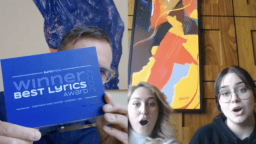What would you give to participate in the Eurovision Song contest? ‘Everything’, an artist would say, but what does that really mean, ‘everything’? Muhamed Fazlagic (Fazla) and his band must have had an idea, when they ran for their lives across an airplane strip near Sarajevo, that night in 1993. To cross the border, to fly to Ireland, to represent Bosnia and Herzegovina at Eurovision. Now, exactly 25 years later, Eurostory asks Fazla to take us back to 1993. It’s a story about war, about a new, but broken country, and about how music can be a matter of life and death.
Hell on earth
He was a soldier perforce. When Muhamed Fazlagic was 24, the war in Bosnia started. Muhamed, who lived in a suburb in Sarajevo right near a stadium, had always hoped for a career in music. Only few days into the war, Serbians conquered his district, and Muhamed had to go into hiding. He decided to join the Bosnian army. ‘I was never a Delta Force or anything,’ he later told the BBC. ‘I was one of many volunteers who guarded the city.’
It was 1993 and Sarajevo was under siege, disconnected from the rest of the world. In 300 days the city became a ‘hell on earth’, as Muhamed would later describe it. ‘No power, no food; death was all around. Wherever we would walk, we were living targets.’
In the midst of all this hardship something extraordinary happened. The Bosnian army instated a musical unit. Every singer, composer and musician was invited to play in Sarajevo, to console the desperate but brave citizens of the Bosnian capital. Music meant to comfort. Not much later the state’s broadcasting company announced a national qualifying contest for the very first ever participation of Bosnia Herzegovina in the Eurovision Song Contest.
A message to the world
Muhamed knew instantly what to do. He gathered a band: Tula, Erlha, Edina, Izo, Enver and himself. All of them soldiers, and all of them determined to give their nation a voice: Sva bol svijeta (‘All the pain in the world’), a song about a soldier who sings for his far away love, outside a city under siege. ‘I can’t pick the stars out of the sky, I can’t find a way out, but I can send you this song so you know I’m alive.’
That particular part of the lyrics had a pecial meaning to Fazla. He and his girlfriend had been separated since the beginning of the war. Sanda, a reporter, had fled back home to Sweden, where she had been living the first thirteen years of her life. Staying in touch was impossible. Fazla explains: ‘That was what I asked my friend Fahrudin Pecikoza (lyricist) to write about. Even before we knew Bosnia would make an attempt to participate in Eurovision. He and Dino Merlin [well-known writer and Eurovision contestant in 2011, JS] eventually wrote Sva bol svijeta. ‘It was an honest story about involuntary separation, a very painful topic. Quite the opposite of typical happy-go-lucky Eurovision songs. Fortunately for them, many people in the West don’t feel our pain, because they never had such a horrible experience. And I am glad they didn’t. But this song was a personal message, which grew into a message for the world.’
‘You have to understand,’ Fazla tells Eurostory, ‘that when we entered Eurovision my country was set to be wiped off the map. Europe appeared to have decided that we were not worth fighting for, but at the same time would not allow us to defend ourselves. People in the West were becoming tired of seeing Bosnians dead and dying. If all you see is people fighting and dying, then you think that this is all that goes on it that country. It was our job to remind the world that we exist. That two hours away from Italy there is a country and a city that hosted the Olympics, where we wear denim jeans, Converse sneakers, drink coffee, play football, listen to music, watch Eurovision. We are, and always have been, just like them.’
The preliminaries
In an improvised television studio eleven acts were performed. Only ten of them had actually made it to the studio, the eleventh act was stranded due to heavy fighting and had to send in a video. Because of constant power failures the studio was forced to run on backup generators, on fuel delivered by soldiers of the United Nations, all bought and paid for on the black market. It was a major operation, but the broadcasting organisation succeeded and pulled it off: anyone with access to a television or a radio was able to listen to the music. New music, sung by voices of this new, but broken country. One song won: Sva bol svijeta.
Getting away
Shooting a video clip in Sarajevo had already been very risky, but to reach the Balkan qualifying contest Fazla and his band had to flee the besieged city. The only way for citizens to escape Sarajevo was via the airport, not by plane, but by walking across the landing strip on foot, within the reach of the Serbian snipers. In an interview with BBC some years ago, Fazla shrugged off the danger he and the band had been in: ‘It was no different to any other time, really. We were being shot at in the city, too!”
Whomever would survive that, had to endure a difficult and long hike through the mountains, via the top of the Igman, the mountain which had served as an Olympic ski slope only a few years before.
Run up the mountains
One night in 1993, shortly after winning the national preliminaries, Fazla and his band ventured out on the perilous journey. ‘An army guide put me into a group with the guitarist and two girls – our back-up singers. Then he told us to run up to the mountains and not get shot.’
Their first attempt failed, and they were sent back. The second attempt, however, was successful. Fazla tells the BBC: ‘It was in the middle of the night and it was very muddy, because it’d been snowing so much, and I started running, and my shoes got stuck. But I couldn’t stop – people were shooting – so I kept going, without shoes, five, six hours. It was only when we got to the top of the Igman, that someone gave me a new pair.’
Although the escape was successful, not everyone made it out alive. Six of that night’s escapees were killed, seventeen others were injured. The band, however, survived and reached Zagreb.
The way to Ireland
The first thing Fazla did after reaching Zagreb, he tells Eurostory, was call Sanda, his girlfriend. ‘She immediately took a plane to Zagreb.’ The soldier was finally reunited with the love for who he sung his song. ‘We decided to stay together from then on, and that we wanted to marry as soon as possible.’
So they got married. At the same time, the song had a road to travel as well. Only three of the seven Balkan states who participated in Qualification for Millstreet were allowed to continue to Ireland. Fazla became one of them, the way to Millstreet was open. One would assume Fazla and the band would plan to stay in Ireland after Eurovision, far away from the war. But Fazla knew he wanted to return to Sarajevo. ‘We did not have to return, but we all wanted to. The fight to save our country did not finish after Eurovision.’
Honeymoon
Twenty-five delegation members went to Ireland. For two of them, Fazla en Sanda, this trip was also their honeymoon. Looking back at the days before the Song Contest, Fazla especially remembers the tension slowly increasing. ‘We were the first people to represent Bosnia on an international scale. Against all odds we made it to Ireland and we knew our people were watching us, so of course we were ecstatic to represent our country. We had the tremendous responsibility of representing people who had suffered so very much. We were also doing the thing we loved to do more than anything. I tried to stay cool, calm and collected, but I worried about how the orchestra would perform without our conductor.’
That conductor was supposed to come to Ireland a few weeks after Fazla and the band left Sarajevo. But the fighting in Bosnia had become so dire that leaving the country turned out to be impossible. Noel Kelehan, a famous Irish conductor, would take his place.
‘It was a strange time. Everyone was very friendly to us, but it was obvious many people did not understand the complexity of the situation. Most people at Eurovision were too nervous to ask, or preferred not to mention it. That said, they were all very nice, compassionate and wanted to make us feel good in their presence.’
Three minutes
And then it was time for their three minutes on stage at Millstreet. The soldier sang his song, with his comrades around him, about writing a letter to his lover, who fled from the war, that he is well, and that he has to keep fighting. In a preview in 1993, The Independent openly wished Fazla would win. ‘If ever the Contest delivered a real song for Europe, this was it. (…) The young men and women of Fazla Band are so desperate to bring Bosnia’s message to Europe that they have risked their lives to take part in Eurovision, of all things. It may be that a victory in the Song Contest is the only victory that Europe is prepared to help them win.’
Proof of existence
The country’s pain was now to be heard all over the world. For that moment, nothing else mattered anymore. Fazla doesn’t reflect on the excitement during the performance itself, the standing ovation afterwards, or the fact that they were proclaimed as the ‘best dressed act’ of the evening. ‘For us it was a very serious event. It wasn’t entertainment. We were showing our independence – proving it. We were confirming our existence.’
Was Eurovision the right stage for this? Fazla: ‘I hope people didn’t expect us to sing about lollypops and Mickey Mouse. Music is art and art is a reflection of life. Every song is a product of someone’s internal projection or feelings. At that time, that is exactly what and how we felt. The song became political because it came to symbolize the suffering in Bosnia and represent those who were living such an atrocious life in Europe at the end of the 20th century. But it was not written as a political statement. I am adamant about this.’
Sarajevo calling
And then it was over. Three minutes, and all the pain in the world had spilled out onto a stage in Ireland. The music had faded away, the camera showed an audience full of serious faces. Later that evening, during the collecting of European votes, after minutes of waiting for the satellite connection, a crackling voice was heard. ‘Good evening Millstreet, this is Sarajevo calling’, followed by a loud applause from the audience. Another proof of existence.
Fazla: ‘After Eurovision we became stars in Bosnia and with the Bosnian diaspora, so we completed the recording of the album Sva bol svijeta and toured with it at several humanitarian concerts throughout Europe. After this we returned home. Sanda and I stayed together, as we had promised each other. It was hard to get back to Sarajevo, because the route we had used to get to Ireland was no longer available, since the Bosnian Croats had opened a new front in Bosnia. We had to wait in Zagreb for a flight with a military transport aircraft (UNPROFOR). That is how we returned to Sarajevo.’
Not too seriously
‘I try not to take myself too seriously,’ Fazla tells us. ‘We did what we had to do at the time, and in doing so, we played a small role in defending and promoting our country. However, when you examine the circumstances of the war in Bosnia and compare our journey to Eurovision with the sacrifices made by the men and women who defended our city and country, often with bare hands or the most basic of weaponry, then you see why we cannot take our achievements too seriously. Of course, this Eurovision entry was performed under unique circumstances and as such we have made history. I didn’t ask for any of that, I was perfectly happy to represent my country without any financial compensation. I never took a penny from that song or collected any royalties. I am happy I had a chance to be part of a big show and even happier that I didn’t disappoint my country.’
Relevance
The message of Sva bol svijeta is still as relevant as in 1993, Fazla assures. ‘We showed ourselves to Europe, but Europe back then didn’t care about us. I don’t think much has changed since. Europe is still twisting our arm, while placating those who did us such great wrongs. Over all it was a unique and extraordinary experience and it makes us feel good about ourselves. We at least tried to make a difference. How much we succeeded, that is for others and history to judge.’
The powerful ability Fazla sees in Eurovision is to symbolize thoughts and desires of many different people. Even until this day music can play a huge role in a divided Bosnia. ‘In former Yugoslavia we all grew up with the same music, the same stars. Music has the power to unite and build bridge. It can ease tensions, animosities or rivalries if they exist. The best example would be the very successful Bosnian entry Lejla in 2006, where there was collaboration between Bosnian authors Hari Varešanović and Fahrudin Pecikoza, and Serbian Željko Joksimović. The song became third, the all-time best result for Bosnia and Herzegovina.’
In America
After the war Muhamed was offered a chance to study in the USA. Sanda came with him. ‘I was mentally, physically and emotionally drained from the war. I even lost interest in music for some time. I didn’t want to record or perform. I was ready for something new. So, systematic education was very therapeutic for me.’
He took several courses in management and development, and finally graduated in applied sociology at the University of Louisville. Meanwhile, he founded a soccer academy, United 1996 FC, where he is still General Manager and Director of Coaching. Occasionally he publishes articles and teaches sociology at universities. Sanda and Fazla have a daughter, Sarah, who is 14 years old now. With great joy and pride he follows her in her tennis endeavours.
Eurovision
Fazla still follows Eurovision, especially when Bosnia participates. That’s not a certainty at all; 2016 was the last time Bosnia participated, at that time the country hadn’t had an entry for four years. This year they are absent, too. Fazla: ‘Unfortunately, right wing Croatian and Serbian political parties in Bosnia do not want to fund a national television station or anything that carries and promotes the name of Bosnia and Herzegovina. So frequently Bosnia cannot enter. I hope it will change one day.’
In everything Fazla tells us, his love for Bosnia still can be felt. Recently, he started getting involved in Bosnian politics, as an activist. From a distance, that is. ‘For right now… I can honestly say, I am in a good place.’
